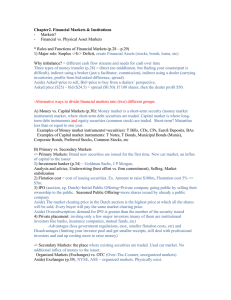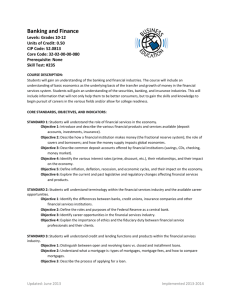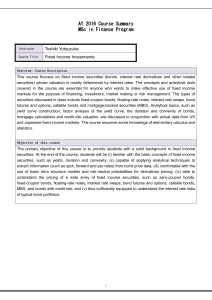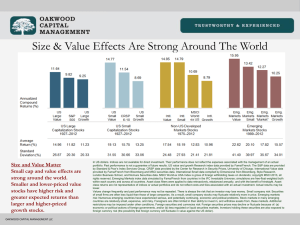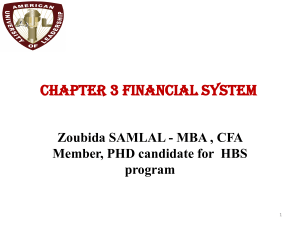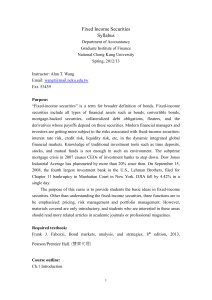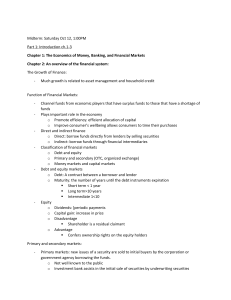FINANCE
advertisement
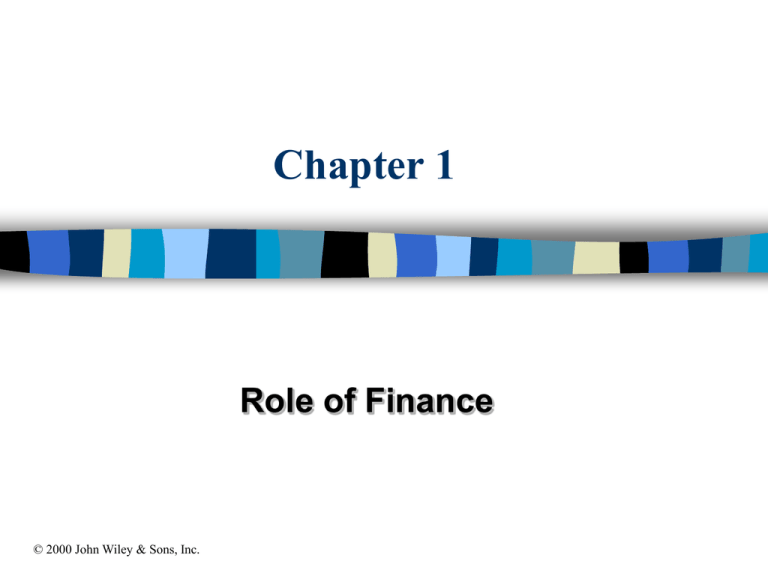
Chapter 1 Role of Finance © 2000 John Wiley & Sons, Inc. Chapter Outcomes Define what is meant by finance Explain why finance should be studied Describe the basic requirements in a modern financial system Identify the major financial intermediaries and their roles in the U.S. financial system 2 Chapter Outcomes (Continued) Identify and explain measures of wealth that are traded in U.S. financial markets Describe the financial functions performed in the U.S. financial system Identify and discuss some career opportunities in finance 3 What Is Finance? FINANCE: Study of how individuals, institutions,and businesses acquire, spend, and manage financial resources 4 Types Of Finance MACRO FINANCE: Study of how financial intermediaries, financial markets, and policy makers interact and operate within financial systems BUSINESS FINANCE: Study of financial planning, asset management, and fund raising by businesses and financial institutions 5 Types Of Finance (Continued) PERSONAL FINANCE: Study of how individuals prepare for financial emergencies, protect against premature death and property losses, and accumulate wealth 6 Why Study Finance? As an individual you should want to make informed economic decisions Knowledge of finance should help you better manage existing financial resources and accumulate wealth over time To be successful in the business world, it is important to have an understanding of business finance 7 Basic Requirements Of A Financial System Monetary system Savings-investment process Financial markets 8 Five Types Of Financial Intermediaries Depository institutions Contractual savings organizations Investment organizations Finance/credit organizations Securities markets-related organizations 9 Basic Types Of Securities Markets PRIMARY SECURITIES MARKET: market involved in creating and issuing new securities, mortgages, and other claims to wealth SECONDARY SECURITIES MARKET: market for transferring existing securities between investors 10 Measures Of Wealth MONEY: anything that is generally accepted as payment REAL ASSETS: land, buildings, machinery, inventory, and precious metals FINANCIAL ASSETS: claims against the income or assets of others 11 Types Of Financial Markets MONEY MARKETS: where debt instruments of one year or less are traded CAPITAL MARKETS: markets for longer-term debt securities and corporate stocks 12 Types Of Money Market Instruments U.S. Treasury bills Negotiable certificates of deposit Bankers’ acceptances Federal funds Commercial paper Repurchase agreements 13 Types Of Capital Market Securities And Instruments U.S. Treasury notes and bonds U.S. Government agency bonds State and local government bonds Corporate bonds Corporate stocks Real estate mortgages 14 Financial Functions In The U.S. Financial System Creating money Transferring money Accumulating savings Lending/investing savings Marketing financial assets Transferring financial assets 15 Career Opportunity Areas In Finance Business financial management Financial intermediaries Securities markets field Government or non-for-profit organizations Personal financial planning 16 Plan Of Study PART 1: THE FINANCIAL SYSTEM covers the environment of finance including the role of financial institutions in it PART 2: INVESTMENTS covers financial markets and the process of investing in financial securities such as stocks and bonds 17 Plan of Study (Continued) PART 3: BUSINESS FINANCE covers financial management and how the business sector interacts with the financial system 18


